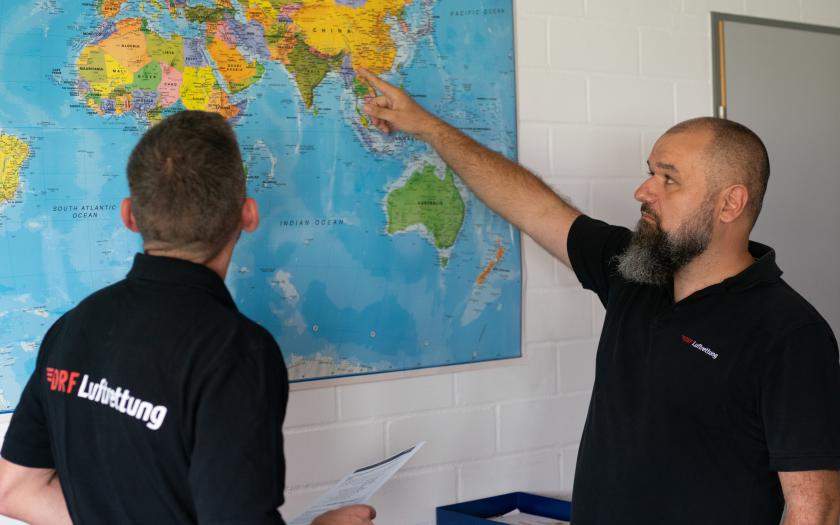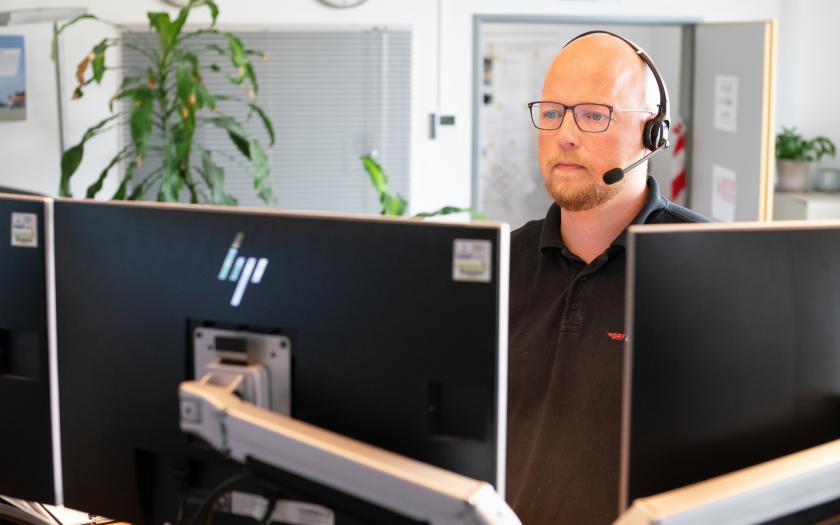
Daniel Hodap (Source: DRF Luftrettung)
They ensure that the worldwide repatriations on board DRF Luftrettung ambulance aircraft run smoothly and that the appropriate rescue equipment is supplied throughout Germany. They piece together all the mission elements like a puzzle so that patients are guaranteed the best medical care possible. We are, of course, talking about the dispatchers at the DRF Luftrettung alert centre. The 12-strong team in the Operation Center at Karlsruhe/Baden-Baden Airport is active 365 days a year to organise the logistics surrounding the missions.
When Carsten Atrops and Daniel Hodapp start their shifts at the DRF Luftrettung alert centre, they never know exactly what the day or night will bring. However, there is one thing that is clear: they will do everything in their power to dispatch the right rescue equipment to patients in need and to repatriate people stuck abroad after an accident or falling ill. For them, the patients are the top priority of their work.
What Daniel Hodapp particularly appreciates about his job is the diversity and the great responsibility he has. ‘We coordinate the flights and medical treatment in DRF Luftrettung’s worldwide repatriations. Whether in Majorca, in Congo or overseas, we keep a close connection to hospitals abroad and to patients. The first task is to ascertain the patient’s condition and how transportable he or she is. After that, we look at the logistics for the flight,’ says Daniel Hodapp. Carsten Atrops adds, ‘That includes seamless flight planning, obtaining take-off permits, landing permits and overflight rights, refuelling stops and crew rostering. Every last little step must be meticulously planned, including for example transporting the crew from the airport to the foreign hospital, transporting the patient by ambulance on the ground and the crew’s accommodation options.

Meister der Disposition (Quelle: DRF Luftrettung)

Carsten Atrops (Quelle: DRF Luftrettung)
Our colleagues at the alert centre are also responsible for dispatching and monitoring intensive-care transports in Germany, in addition to worldwide repatriation. Unlike air ambulance, intensive-care transports need to be planned in tight time frames. Which intensive-care helicopters are available for transporting patients? Or is it better to transport them with a specialised ambulance on the ground for a particular mission? How time sensitive is the mission? What weather conditions need to be considered? Are there any other limitations? These are all questions that must be answered in close cooperation with hospitals and local rescue coordination centers.
All in all, it is a feat achieved at a time when the priority is to make decisions under pressure and juggle multiple missions in parallel. The workers have been given superb training for this, though, and bring a broad wealth of experience with them. Carsten Atrops has been on the DRF Luftrettung team since 2018 and Daniel Hodapp since 2012. They both have roughly 20 years of experience in ground-based emergency services, including in leadership roles.
Exceptional nature of worldwide repatriation
Carsten Atrops always thinks it is a success when missions run completely smoothly and he has offered good service support in the background for mission crews. ‘In the morning it’s often hard to say if a plan will work as envisaged. Yet in the end, it’s a great endorsement of my work when the patient has been successfully transported without any delays. It’s like firing a bullet and then having it cleanly hit the target.’
Daniel Hodapp adds, ‘I’m still hugely fascinated by air rescue, this combination of aviation and medical components, even after almost 10 years’ working at DRF Luftrettung. We encounter new conditions abroad and are confronted with a wide range of medical standards. I’m very satisfied when the rescue process runs optimally.’
The latest challenges – Covid-19
The mission coordinators are required to be even more flexible during the Covid-19 era, with a significantly increased amount of information requiring clarification: ‘The safety regulations and travel conditions in each country are constantly changing. Each day we have to check: where are the risk areas? What countries are counted as virus mutation zones? What does that mean for any accompanying persons and for our crews?’ says Daniel Hodapp, listing some of the key questions to be asked. ‘This means more work overall in our day-to-day operations. However, our fantastic team has done an excellent job overcoming these challenges so far,’ adds Carsten Atrops.
Collaboration with clients and assistance organisations
The arrangements with clients and assistance organisations are an important part of the work done at the alert centre; they ultimately represent the connection to the patients. What does working with clients entail? The work done by our colleagues at the alert centre is made easier when there are as many details as possible about the patient abroad. ‘The more precise the information is, the more precision we can apply when organising the logistics. We find it very helpful when we can discuss potential problems in advance, before they happen. Candidness and trust are the foundation of our collaboration,’ emphasise Carsten Atrops and Daniel Hodapp in unison.
Author: Eva Baumann, Press Officer
